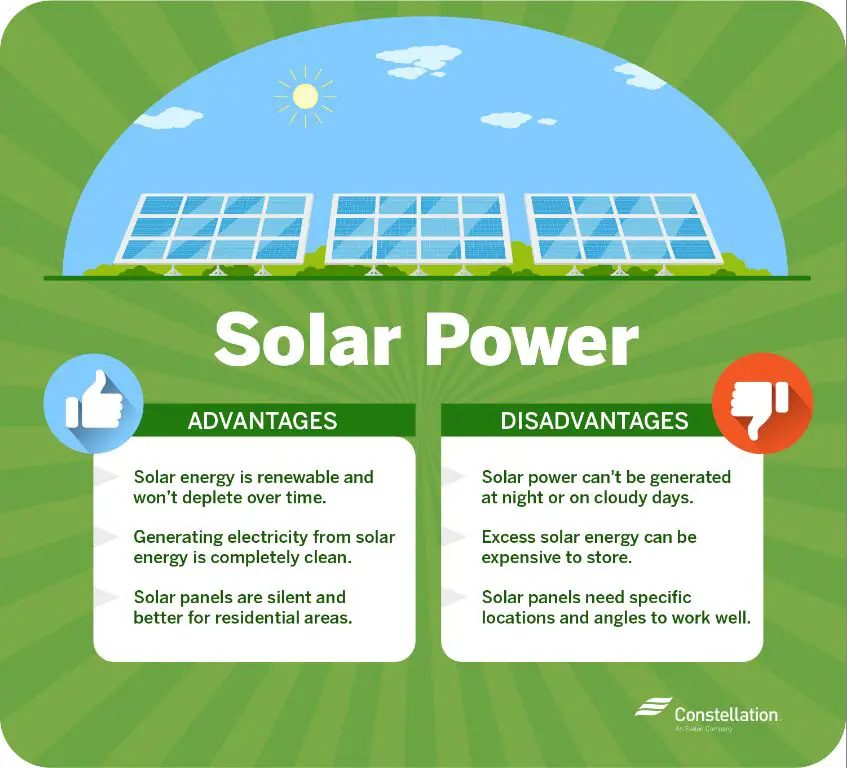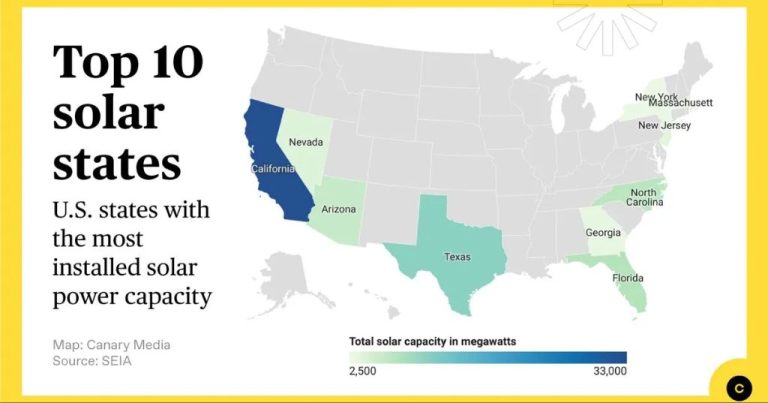What Are Two Advantages Of Producing Electricity From Solar Energy Instead Of Fossil Fuels?
Solar is a renewable resource

Unlike finite supplies of fossil fuels that will eventually run out, the sun provides a virtually unlimited source of energy for the earth. The amount of solar energy that hits the earth’s surface in one hour is more than the entire world uses in a year. Sunlight can be harnessed in all areas of the world via solar panels and converted to electricity without producing greenhouse gas emissions or toxic waste. Solar energy is an abundant renewable resource that will never be exhausted, making it a sustainable long-term energy solution.
Reduces reliance on imported fuels
Solar energy allows countries to generate electricity domestically rather than importing fossil fuels like coal, natural gas, and oil. Many nations spend billions importing coal, natural gas, and oil from other countries to power their grid. But solar panels allow a country to tap into the power of the sun to generate clean electricity at home. According to a report by the International Renewable Energy Agency, renewable energy like solar can free economies from volatile fossil fuel prices and imports (source). By investing more in solar power, countries can rely less on imported fossil fuels and improve their energy independence and security.
Cleaner for the environment
Solar energy has minimal emissions and environmental impact compared to burning fossil fuels for electricity generation. Unlike coal, natural gas, and oil, solar panels produce electricity without emitting greenhouse gases like carbon dioxide and methane. According to the U.S. Energy Information Administration, the average emission rates for coal plants is 893g CO2/kWh, while solar PV emits only 46g CO2/kWh over its life cycle from manufacturing to decommissioning (EIA). Solar generation helps reduce air pollution and mitigate climate change. The Union of Concerned Scientists found that generating a kilowatt-hour of electricity from solar rooftop systems prevents 3.3 pounds of CO2 emissions compared to burning coal (Department of Energy). Widespread adoption of solar can significantly curb greenhouse gas emissions from the electricity sector.
Improves public health
One of the biggest advantages of solar energy is that it improves public health by reducing air pollution from fossil fuels. Burning coal, oil, and natural gas releases particulate matter, nitrogen oxides, sulfur dioxide, mercury, and other harmful pollutants into the atmosphere. These emissions have been conclusively linked to increased rates of respiratory disease, heart disease, cancer, and premature death (1). Studies have found that air pollution from US power plants leads to over 50,000 premature deaths per year. Replacing fossil fuels with solar photovoltaics eliminates emissions from electricity generation. This leads to lower rates of respiratory and cardiovascular disease, fewer asthma attacks, hospital visits, lost work days, and deaths. One analysis estimated transitioning to clean energy in the US could prevent over 100,000 premature deaths through 2050. The health benefits of solar energy go beyond avoiding pollution from fossil fuels. Rooftop solar can also reduce peak summertime temperatures in cities and lessen the health impacts of extreme heat. Overall, the positive effects of solar on public health make it a wise long-term investment.
(1) https://www.energy.gov/eere/health-and-safety-benefits-clean-energy
Creates jobs and economic growth
Expanding solar power generation creates jobs across many sectors of the economy. Installing and maintaining solar panels requires local workers such as electricians, construction workers, engineers, and manufacturing employees. According to the National Solar Jobs Census, over 250,000 Americans work in solar, a number that increased by 168% over the past decade. The solar industry is creating jobs 17 times faster than the overall economy.
In addition to direct solar jobs, expanding solar generation stimulates economic growth more broadly. Solar projects increase demand for materials like steel, glass, and aluminum, benefiting supporting industries. Construction of solar farms requires developers, financing, and land purchases. Solar also lowers electricity prices over time, putting more money in consumers pockets to spend at local businesses.
Low operating costs
One of the biggest advantages of solar power is that it has very low operating costs after the initial installation. Unlike fossil fuels, solar panels do not require any fuel to generate electricity. This means there are no ongoing fuel costs once the solar panels are in place.
According to an analysis by the International Energy Agency, the cost of generating solar power ranges from $20-40 per MWh in India and China to $30-60 per MWh in Europe and the US [1]. This is far lower than the operating costs of coal, natural gas, or other fossil fuel plants.
Solar only requires some basic maintenance like cleaning the panels occasionally. Otherwise, sunlight is free. This gives solar power a huge advantage over fossil fuels that continually need new supplies of coal, gas or oil to operate.
Can decentralize energy production
Rooftop solar allows small-scale distributed electricity generation. Rather than relying on large, centralized power plants, solar panels on homes and businesses feed electricity into the grid. This decentralizes energy production, improving grid resilience and reducing reliance on centralized infrastructure. According to Energy5, decentralized solar systems consist of “multiple small-scale installations, such as rooftop solar panels or community solar.” By distributing energy generation, decentralized solar provides more flexibility and protects against disruptions
The LinkedIn article argues that “The fusion of rooftop solar and Bitcoin mining signifies a move from centralized to decentralized energy systems.” By combining rooftop solar with technologies like Bitcoin mining, decentralization can be accelerated. Ultimately, decentralized systems offer more consumer choice, resilience, and flexibility for meeting energy needs.
Protects against fuel price volatility
Solar energy shields consumers from changes in oil and gas prices. When electricity is generated from solar panels, there is no ongoing fuel cost. This means the price of solar power stays stable even when the prices of fossil fuels like oil, gasoline, and natural gas fluctuate on global markets.
According to a report from the Center for Energy and Climate Solutions, renewable energy can provide greater stabilization of electricity costs during times of fuel price volatility [1]. Homes and businesses with rooftop solar are protected from volatility in the fossil fuel market.
For example, a solar policy in Rhode Island ensured that households with solar were shielded from high winter natural gas prices in early 2022 [2]. Solar energy can provide a hedge against unpredictable swings in fossil fuel costs.
Improves energy access
Solar energy can provide electricity to rural and remote areas that lack connection to traditional power grids. According to MIT News, mini power grids powered by solar panels and batteries are being used to bring electricity to rural villages in Lesotho for the first time. Solar microgrids and standalone solar systems are ideal for serving dispersed populations in remote areas where extending the central grid is too costly. Organizations like Self Help Africa are installing solar microgrids and home systems in rural communities across sub-Saharan Africa to provide basic electricity services for lighting, phone charging, appliances, and productive uses like milling or refrigeration. With falling costs, solar energy solutions can now compete with traditional rural electrification approaches and overcome key barriers like high upfront costs and lack of access to credit in remote regions.
Promotes energy independence
Solar energy allows countries to produce their own electricity rather than rely on imported fossil fuels. This promotes energy independence and security, giving nations more control over their energy supply. For example, the United States imports petroleum from countries in the Middle East, Africa, Canada, and South America according to the U.S. Energy Information Administration (https://www.eia.gov/energyexplained/oil-and-petroleum-products/imports-and-exports.php). Expanding domestic solar power would reduce dependence on foreign oil and provide a sustainable, renewable energy source within the country’s borders. The U.S. Department of Energy states “The United States can achieve energy independence and security by using renewable power” (https://www.energy.gov/eere/energy-independence-and-security). Solar supports this goal. Households can also gain energy independence by installing solar panels to produce their own electricity (https://www.solar.com/learn/gain-energy-independence/). This gives homeowners control over their energy supply and protects them from grid outages or rising electricity prices. Overall, solar energy promotes national and consumer energy independence.





